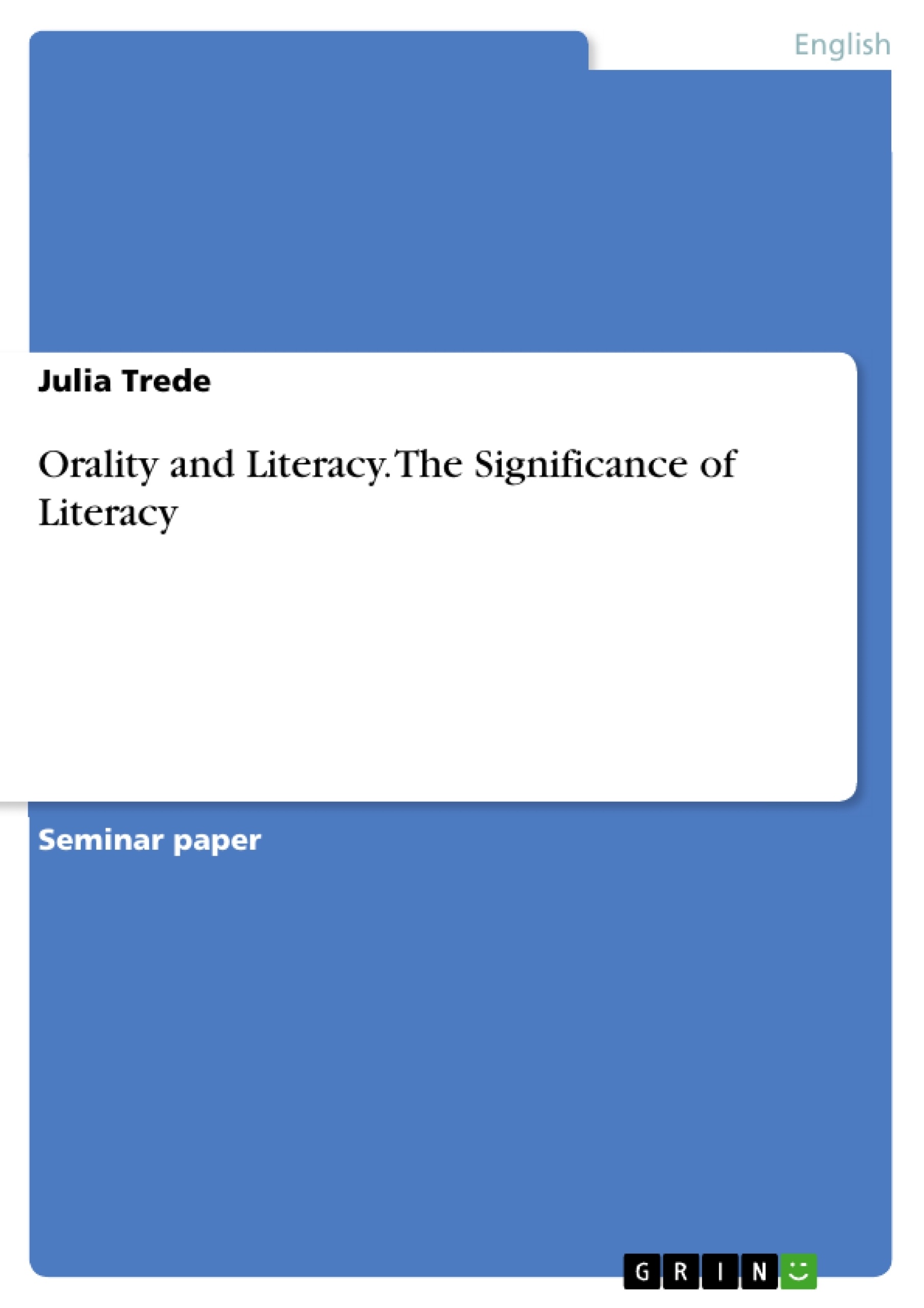Writing has become an indispensable and inherent part in the daily routine of western societies. We learn how to read and write without considering the significance of a literate culture, being interested in how oral cultures develop to literate cultures, or what impact literacy has on a culture. These considerations will be subject of this paper.
The initial chapter provides a short overview of previous research in the field of orality and literacy. Following Dürscheid, chapter two defines the concept of literacy and orality, whereby the latter concept will be subdivided into primary and secondary orality. In order to clarify which techniques oral cultures used before the evolution of writing, chapter three discusses the characteristics of oral cultures that have been determined by Walter Ong. Subsequently, I will focus on the shift from orality to literacy showing that writing was not simply invented but made its transition in evolutionary stages, i. e. from pictographic precursors of writing to a fully developed phonetic writing system. The last chapter concentrates on the impact of literacy on the society making clear that the evolution of writing affected entire social areas and led to the emergence of crucial developments in politics, philosophy, and theology.
Inhaltsverzeichnis (Table of Contents)
- Introduction
- 1. Defining Literacy and Orality
- 1.1. Medial and Conceptual Dimensions
- 1.2. Literacy
- 1.3. Orality
- 1.3.1. Primary Orality.
- 1.3.2. Secondary Orality.
- 2. Characteristics of Oral Cultures
- 2.1. Additive rather than subordinative
- 2.2. Aggregative rather than analytic
- 2.3. Redundant or 'copious'
- 2.4. Conservative or traditionalist
- 2.5. Close to the human life world
- 2.6. Agonistically toned,
- 2.7. Empathetic and participatory rather than objectively distanced,
- 2.8. Homeostatic
- 2.9. Situational rather than abstract
- 3. From Orality to Literacy
- 3.1. Precursors of Writing: Cave Paintings and Cuneiforms
- 3.2. Hieroglyphs
- 3.3. Greek Alphabet
- 4. Impact of Literacy on Society
- 4.1. Degree of Complexity
- 4.2. Archiving
- 4.3. Problem of Interpretation
- 4.4. Social Differentiation
Zielsetzung und Themenschwerpunkte (Objectives and Key Themes)
This paper aims to explore the significance of literacy by investigating the development of oral cultures into literate cultures and the impact of literacy on society. It examines the concepts of orality and literacy, delves into the characteristics of oral cultures, traces the evolution of writing from its precursors to a fully developed phonetic system, and analyzes the effects of literacy on various aspects of society.
- Defining and distinguishing literacy and orality, including primary and secondary orality.
- Understanding the characteristics of oral cultures, as identified by Walter Ong.
- Tracing the transition from orality to literacy, highlighting the evolution of writing systems.
- Exploring the impact of literacy on society, focusing on areas like complexity, archiving, interpretation, and social differentiation.
- Analyzing the influence of literacy on consciousness and verbal expression.
Zusammenfassung der Kapitel (Chapter Summaries)
The first chapter introduces the concepts of literacy and orality, differentiating between their medial and conceptual dimensions. It further specifies the concept of literacy and examines the different forms of literacy, including chirographic, typographic, and compu-script writing.
Chapter two delves into the characteristics of oral cultures as defined by Walter Ong. These include additivity, aggregativity, redundancy, conservatism, closeness to the human life world, agonistic tone, empathy and participation, homeostasis, and a situational rather than abstract nature.
Chapter three traces the transition from orality to literacy, starting with the precursors of writing such as cave paintings and cuneiforms. It then explores the development of hieroglyphs and the Greek alphabet, highlighting the evolutionary stages of writing.
Chapter four focuses on the impact of literacy on society. It examines the increased complexity, the emergence of archiving, the problem of interpretation, and the role of literacy in social differentiation.
Schlüsselwörter (Keywords)
The main keywords and focus topics of this work include orality, literacy, primary orality, secondary orality, oral cultures, literate cultures, writing systems, evolution of writing, impact of literacy, consciousness, verbal expression, and social differentiation.
Frequently Asked Questions
What is the difference between primary and secondary orality?
Primary orality refers to cultures with no knowledge of writing, while secondary orality refers to modern cultures where orality is sustained by electronic media like radio or TV.
What are the key characteristics of oral cultures according to Walter Ong?
They are often additive rather than subordinative, aggregative rather than analytic, conservative, and close to the human life world.
How did writing evolve from its precursors?
It transitioned in stages, starting from cave paintings and cuneiform to hieroglyphs, eventually leading to fully developed phonetic systems like the Greek alphabet.
What impact does literacy have on human consciousness?
Literacy allows for more abstract thinking, complex social differentiation, and the ability to archive and interpret information over time.
Why is archiving significant in literate societies?
Archiving allows for the preservation of knowledge and history, which changes how society handles information compared to the homeostatic nature of oral cultures.
- Citation du texte
- Julia Trede (Auteur), 2013, Orality and Literacy. The Significance of Literacy, Munich, GRIN Verlag, https://www.grin.com/document/511358



